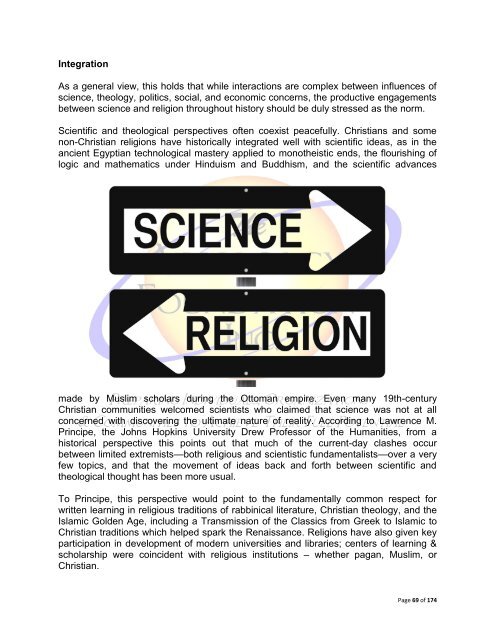The Gift of Spirituality
The Gift of Spirituality
The Gift of Spirituality
Create successful ePaper yourself
Turn your PDF publications into a flip-book with our unique Google optimized e-Paper software.
Integration<br />
As a general view, this holds that while interactions are complex between influences <strong>of</strong><br />
science, theology, politics, social, and economic concerns, the productive engagements<br />
between science and religion throughout history should be duly stressed as the norm.<br />
Scientific and theological perspectives <strong>of</strong>ten coexist peacefully. Christians and some<br />
non-Christian religions have historically integrated well with scientific ideas, as in the<br />
ancient Egyptian technological mastery applied to monotheistic ends, the flourishing <strong>of</strong><br />
logic and mathematics under Hinduism and Buddhism, and the scientific advances<br />
made by Muslim scholars during the Ottoman empire. Even many 19th-century<br />
Christian communities welcomed scientists who claimed that science was not at all<br />
concerned with discovering the ultimate nature <strong>of</strong> reality. According to Lawrence M.<br />
Principe, the Johns Hopkins University Drew Pr<strong>of</strong>essor <strong>of</strong> the Humanities, from a<br />
historical perspective this points out that much <strong>of</strong> the current-day clashes occur<br />
between limited extremists—both religious and scientistic fundamentalists—over a very<br />
few topics, and that the movement <strong>of</strong> ideas back and forth between scientific and<br />
theological thought has been more usual.<br />
To Principe, this perspective would point to the fundamentally common respect for<br />
written learning in religious traditions <strong>of</strong> rabbinical literature, Christian theology, and the<br />
Islamic Golden Age, including a Transmission <strong>of</strong> the Classics from Greek to Islamic to<br />
Christian traditions which helped spark the Renaissance. Religions have also given key<br />
participation in development <strong>of</strong> modern universities and libraries; centers <strong>of</strong> learning &<br />
scholarship were coincident with religious institutions – whether pagan, Muslim, or<br />
Christian.<br />
Page 69 <strong>of</strong> 174

















